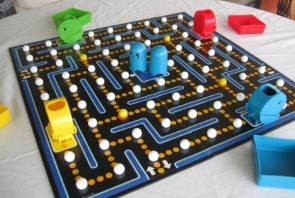I often wonder “why don’t board games sell like video games?” I know that there have been a few tabletop games that have sold a million or more copies (many of which took decades to do so) but none of them sell with the speed that video games do. Why not?
After some observation and thought (and experience, as I have been playing and creating tabletop games and video games my whole life), I came to the following conclusion: Videogame players are the same audience as movie audiences, while board game players are the same audience as book readers.
You just have to look at the success of board games in retail spaces like Barnes and Noble – and the decline of their movie section – to see this in action. However, I think there is something else going on and it has to do with each medium’s respective audiences. In terms of attention span and temperament, the audiences for these media are very different. Each medium has several factors that appeal to or turn off an audience. I call these factors the barriers to entry. Movies and video games have a “low” barrier to entry while books and board games have a “higher” barrier to entry.
Let’s look at the barrier to entry to watch a movie. A movie viewer needs the time (roughly 90-120 min) and money (or access if we are including today’s streaming services) to watch the movie. If you want to be pedantic, you can include attention span to that. However, once the movie has started, the audience member’s gratification can be almost immediate. Remember back to the first time you saw Star Wars (Star Wars: Episode IV: A New Hope to those of you who didn’t watch it in 1977) and when that Star Destroyer came rumbling by? I don’t know about you but I was enthralled from that opening scene. Immediate gratification.
The barrier to entry to video games is higher than a movie’s but the time to gratification can be the same. Audience members require (if they are playing a console game) the money for the game system (several hundred dollars) and the software ($40-60), the ability/dexterity to play the game (which can often be a factor as in why someone doesn’t play or finish a game) and, of course, the time to play the game (the average is 6 – 20 hours). However, if you are playing a mobile game then the time commitment is much, much shorter - closer to minutes than hours. Players put up with these factors because, just like movie audiences, a video game player can get almost immediate gratification from playing a game.
The book reader’s barrier to entry is almost the opposite of a movie/video game. The product is far less expensive than video games (closer in the case of a movie) but the time commitment can be considerably longer (depending on the length of the book) and, more importantly, requires constant engagement from the reader. Unlike movies, which is a completely passive experience, if book readers stop reading, the experience stops. The same is true for many video games, but it is possible to “play” a video game absentmindedly. Another barrier to entry is that book readers have to make their decision to engage in the content based solely on faith. Movies and video games have trailers – it is easy for audiences to make a decision to engage in the content based solely on the trailer. With a book, there’s the cover and, if you are willing, you might read a few pages in the store or online. There’s a reason that the saying “you can’t judge a book by its cover” exists!
Compared to viewing a movie or playing a video game, Gratification for book readers is much more delayed than a movie or a video game; sometimes substantially. Often a reader might have to finish a book before they know whether they liked it. Or in my own experience, it might require revisiting the book to form an opinion.
The barrier to entry for tabletop gaming typically requires more money than for book reading, but it requires the same level of trust. The maxim “You can’t judge a book by its cover” applies to board games as well. You can watch all of the “watch it played” videos you'd like, but, just like a video game, you just won’t know whether you like a tabletop game until you play it. The forums of BoardGameGeek.Com are littered with reviews stating, “I thought I’d like this more.”
As with video games, the time commitment for tabletop games varies – minutes to hours – but modern hobbyist games often trend towards hours. And don’t get me started on campaign games like Gloomhaven, Kingdom Death: Monster and Dungeons and Dragons. (I have a friend who has been playing the same D&D campaign for decades!)
Of all of the entertainment media, the game rules offer the highest barrier to entry. Designer Rob Daviau has noted that “the best moment of owning a game is when you open the box and the worst moment is when you read the rules.” I don’t know about you, but there have been many times where I have read the rules to a game, thought I understood how to play it and still “played it wrong.”
Finally, there is one last barrier to entry to tabletop gaming: Other people. While books, movies and most video games can all be enjoyed alone, most games require other players to even engage. It can be challenging to gather the players necessary to play a tabletop game. This is one of the reasons why I think “solo modes” have taken off in board gaming.
So, will “board games ever sell like video games?” My research points to “no”. The barriers to entry for board games is just too high for the mass market. But do they need to sell like video games? I think this starts the discussion for another question, “Why do board games need to be compared to video games or movies or books at all?”
 Games
Games How to resolve AdBlock issue?
How to resolve AdBlock issue? 



























